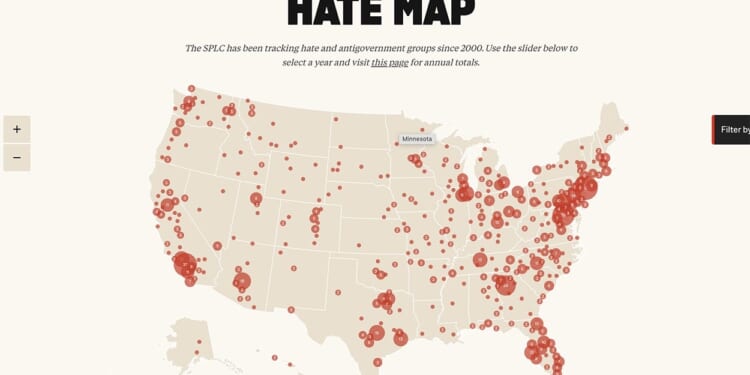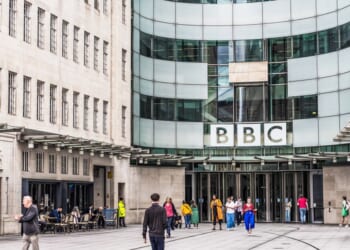Is corporate America finally seeing the light on the Southern Poverty Law Center?
Salesforce, a software company with more than 75,000 employees, became the latest firm to announce it will no longer use the Southern Poverty Law Center’s “hate map” to determine eligibility for its employee giving program.
In a 2022 blog post, Salesforce had stated that it uses the SPLC list “to identify hate groups and keep hateful material off our platform.” That same year, Salesforce’s productivity app Slack banned the Federation on American Immigration Reform, which the SPLC condemns as an “anti-immigrant hate group.” While Salesforce says it doesn’t rely solely on the SPLC for such decisions, it had directed Benevity—a corporate giving and employee engagement platform—to exclude recipients on the SPLC “hate map.”
After facing pressure from The Heritage Foundation, which owns stock in the company, Salesforce announced that it has directed Benevity to stop using SPLC to screen nonprofit recipients of employee contributions.
Benevity, which connects “nearly 1,000 enterprise companies” to a network of 513,000 nonprofits, has managed $16 billion in grants. 1792 Exchange, a nonprofit that exposes bias in corporate businesses, has counted 224 of the Fortune 1,000 companies that use Benevity, and the list includes Alphabet (Google’s parent company), Amazon, Apple, Best Buy, Cigna, Coca Cola, Costco, John Deere, Lowe’s, Macy’s, McDonald’s, Netflix, Paramount, Spotify, UPS, and many more.
In 2021, then-Benevity CEO Kelly Schmitt delivered a PowerPoint presentation explicitly stating that the company had used the “Southern Poverty Law Center Hate List” to vet 2 million nonprofits.
Benevity, however, said it doesn’t use the SPLC “hate map,” but that some clients chose to exclude SPLC-accused “hate groups.”
The Heritage Foundation filed a shareholder proposal with Salesforce last month, urging the company to investigate whether its use of third parties like the SPLC will harm its bottom line. Salesforce told Heritage that it had directed Benevity to stop using the SPLC, and Heritage dropped the proposal Monday.
SPLC’s Influence
After the white nationalist march on Charlottesville in 2017, Big Tech and big business fell over themselves to promote the SPLC. Apple pledged $1 million and JP Morgan pledged $500,000. Platforms like Facebook, Twitter, and YouTube reportedly worked with the SPLC to screen for “hate.”
After all, why not? The SPLC sued Ku Klux Klan groups into bankruptcy in the 1980s, and presents itself as a watchdog, exposing hate via a map that identifies groups supposedly dedicated to vilifying their fellow Americans. The SPLC publishes reports warning companies about the dangers of giving “hate” a platform.
Yet this “hate map” is far from neutral. Alongside the Klan and the Aryan Brotherhood appears Alliance Defending Freedom, a conservative Christian law firm that has won multiple cases at the Supreme Court. Groups of doctors opposing experimental transgender “treatments” for minors appear alongside white nationalists, as if disagreement with the SPLC’s agenda—not genuine hate—is the key criteria for inclusion.
In recent years, the SPLC has included ever more mainstream organizations. In 2023, it added the parental rights group Moms for Liberty to the “hate map.” Last year, it added a group of gays and lesbians as an “anti-LGBTQ+ hate group”—all because they oppose “drag queen story hour” and chemical castration for kids. This year, the SPLC put Turning Point USA—the largest conservative grassroots youth organization—on the “hate map.”
The SPLC’s “Year in Hate and Extremism” dedicated a large report to attacking Turning Point USA and its founder, Charlie Kirk. Four months later, a young man shot and killed him. In text messages to his transgender love interest, the suspect wrote, “I had enough of his hatred. Some hate can’t be negotiated out.”
That’s the same mentality that drove Floyd Lee Corkins II to target the Family Research Council, a conservative nonprofit in Washington, D.C. Corkins told the FBI he used the SPLC “hate map” to target FRC, and that he planned to shoot everyone in the building.
The SPLC condemned both the FRC shooting, which occurred in 2012, and the Kirk assassination, but it has yet to remove either group from the “hate map.”
The SPLC has experienced a multitude of scandals since 2017—from a racial discrimination and sexual harassment scandal that led it to fire its co-founder in 2019 to accusations of union-busting last year that may have contributed to the ouster of its recent president, Margaret Huang.
Yet the assassination of Kirk may be the straw that breaks the camel’s back.
Shareholder Pushback
In the wake of this assassination, many of the conservative groups on the SPLC “hate map” teamed together with The Heritage Foundation and 1972 Exchange, asking companies to stop relying on the SPLC.
After two initial outreaches last month, six major companies distanced themselves from the SPLC.
A recent YouGov poll found the SPLC is 19 points underwater with Republicans. Companies like Salesforce can’t afford to alienate conservative clients, conservative employees, and conservative shareholders.
It is long past time more companies understand just how toxic the SPLC brand is—and follow suit.

















